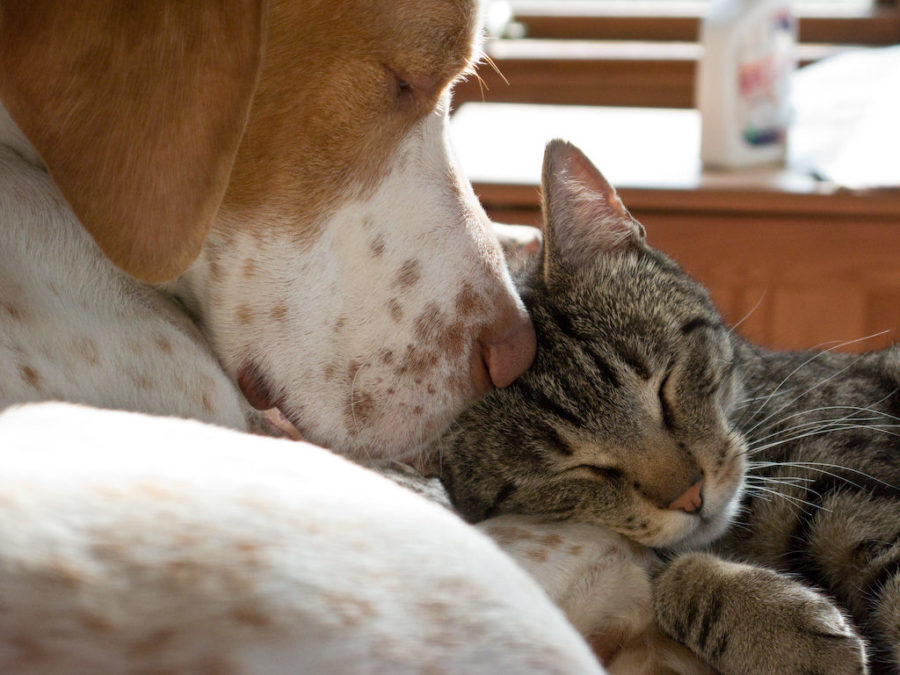Forget Dogs vs. Cats— Why Cat People are Better than Dog People
It’s the age-old question, “Dogs or cats?”. Time and time again, this classic query has provided a simple way to kickstart conversations with friends, family, and strangers. It’s easy to see why; the question is simple yet divisive, lighthearted yet quick to prompt debates. But in all frankness, “dogs or cats” is not usually used for plainly deciding which species is better than the other— instead, it is also used to judge the character of the person in question. I mean, what are stereotypes of crazy cat ladies and obnoxious dog people made for if not being dual meanings to opinions? So yes, while I will have to disagree if you choose dogs, I will also consider it to be one of your (likely many) character flaws.
I have to begin by admitting my biases— I have a cat. So I am, perhaps, obligated to be a cat person. Although, I would argue that there are many whose biases remain unaffected by whatever species they have at home. Take Stephanie Vanharen (‘25): a sophomore who has a dog, is severely allergic to cats, yet still somehow manages to make the correct choice. In her words, cats are just “cute”— it’s that simple. Additionally, Siena Stull (‘25), a dog owner, also identifies as a cat person. This proves that being either a dog or a cat person has deeper reasonings— and therefore meanings— beyond a person’s personal pets and allergies.
So what do these opinions say about someone? Dog people Zara Burnett (‘25) and Bess George (‘25) remarked that generally, people with their preference tend to be more gregarious, both agreeing that a person’s preferred animal reflects their personality. While I find this take to be quite gentle and almost avoidant of the (respectfully) larger issues at hand with their kind, these ideas are somewhat supported by a personality test led by a professor at the University of Texas. The survey test found that, among other things, dog people are more likely to be extroverted and outgoing. However, a study conducted by two psychology professors argues that cat and dog people’s personalities complement their respective animal’s behavior rather than mirror it. In particular, the study found that dog people score higher on a trait called Social Dominance Orientation, which they theorized to occur in companion to the obedient nature of dogs themselves. But this trait is not exactly what it sounds like— in the study’s words, SDO is “an ideological preference for hierarchy between groups, and the belief that higher-ranked groups should dominate those that are lower-ranked” (Alba and Haslam, 2015). This is highly concerning for many reasons, especially as the paper goes on to further explain that people with this trait see inequality as not only “natural” but also “desirable”. Of course, for many people, this may just mean that they prefer having leaders per se, but you can’t deny that there may be questionable undertones of harboring a belief like this. I’m not going to lie— according to my Google searches, Joseph Stalin, Adolf Hitler, and Jeffrey Dahmer are all dog people. Good luck arguing with that— or them.
In theory, exclusive mutt lovers may also be more socially entitled than cat people. As Vanharen states, “Even though people say cats are mean, that’s only because it takes time to earn their trust. People just expect cats to immediately like them; which says a lot about society because if someone isn’t going to be patient with a cat to earn their trust then why would they do the same for me?”. While this idea may sound far-fetched to the unknowing ear, it corresponds with my experiences as a cat owner. While I try to be respectful of my animal’s rigid boundaries and devotion to autonomy, I’ve noticed that the dog people who meet my cat tend to be more bothered by these traits. If they pet her in a place she does not like, they take it personally when she attempts to bite them. If she’s aloof or neglectful of their presence, they may comment on cats being unintelligent (false) or cats not trusting anyone (false!). When my cat was first adopted, my own cousins (dog people) would get unreasonably upset every time my cat walked away from them, wailing, “Why doesn’t she like me?”— all the while forcibly picking her up every two minutes. It’s really not crazy to figure that dog people may transfer this impatient behavior towards animals to how they treat other people.
In conclusion, cat people are better than dog people— it’s that simple. From having high SDO to Jeffrey Dahmer, dog people prove to be concerning in more ways than one. And while you may be currently capsized by a fit of dismay, screaming, crying as you think, This is so biased! This is injustice! I just want to say that although I’m right and you may be wrong, I’m not here to judge you. Only inform.
To be fair though, Saddam Hussein is a cat person.



